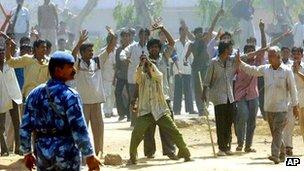India court jails 31 for life over 2002 Gujarat riots
- Published

The riots in 2002 were some of the worst in post-independence India
A court in India has jailed 31 people for life for killing dozens of Muslims during religious riots in the western state of Gujarat nine years ago.
They were found guilty of murder, attempted murder, arson, rioting and criminal conspiracy after 33 people were burned alive in a building.
Another 42 mostly Hindu defendants were acquitted for lack of evidence.
More than 1,000 people, mostly Muslims, died when riots erupted after a train fire killed 60 Hindu pilgrims in 2002.
It was one of India's worst outbreaks of religious violence in recent years.
Muslims were blamed for starting the train fire, and Hindu mobs eager for revenge went on the rampage through Muslim neighbourhoods in towns and villages across Gujarat in three days of violence following the incident.
Fierce debate
The special court dealing with the case sat near Sardarpura village, where the 33 Muslims sought shelter in a small house on the night of 28 February, 2002.
The victims had gathered there to get away from the rioters, who set the building alight. The bodies of 28 people were found at the scene, with five others dying later from their injuries.
Those convicted on Wednesday can appeal to a higher court.
The Gujarat government is led by Hindu nationalist Chief Minister Narendra Modi, who has been accused by rights groups - and a senior police officer in April - of tacitly supporting the rioters.
He denies the allegations but has never apologised for the riots.
Responsibility for the train fire has been the subject of fierce debate between Hindus and Muslims.
In February a special court in Gujarat found 31 people guilty of setting fire to the passenger train in the town of Godhra. It acquitted 63 other people of conspiracy and murder.
The mostly Hindu pilgrims on the train were returning from the town of Ayodhya, itself a flashpoint for communal unrest after a mosque was razed in 1992 by Hindu hardliners. That led to separate riots that also killed thousands of predominantly Muslim people.
An inquiry commission set up three years ago by the Gujarat state government into the 2002 riots said that the burning of the train had been a "conspiracy".
It examined more than 1,000 witnesses during a six-year period, found that 140 litres of petrol had been purchased as part of what it said had been a conspiracy to burn the train carriage.
That commission also exonerated Mr Modi over the riots that followed the blaze.
In 2005, however, a federal government inquiry took a different view, concluding that the train fire had been an accident - probably started by people cooking in one of the carriages - not the result of an attack.
The Sardarpura killings case is one of nine singled out for special investigation by India's Supreme Court - in 2003 its judges castigated the Gujarat authorities for not delivering justice to victims.
- Published17 October 2011
- Published22 April 2011
- Published22 February 2011